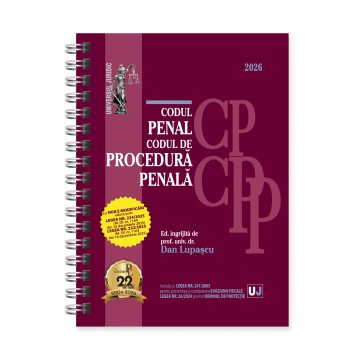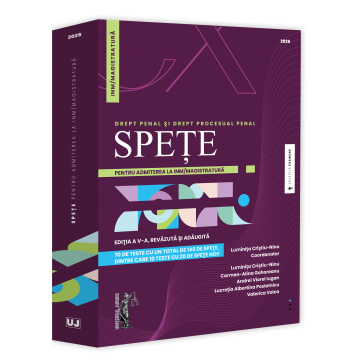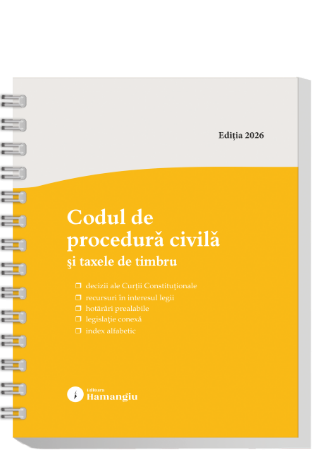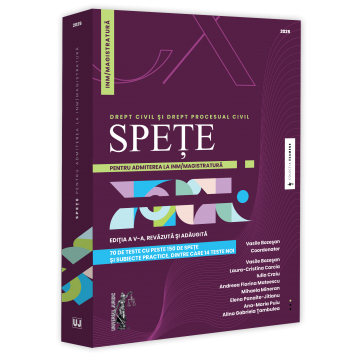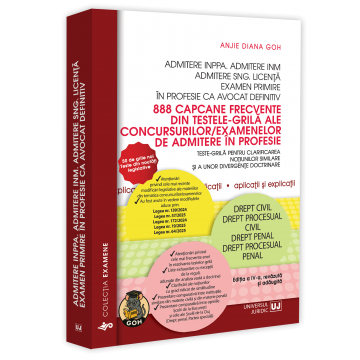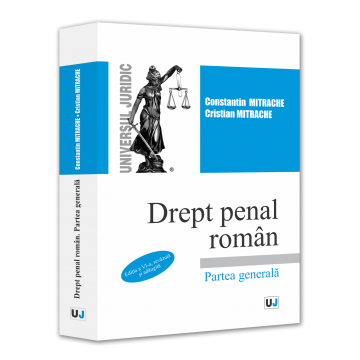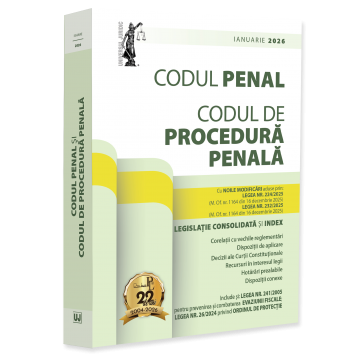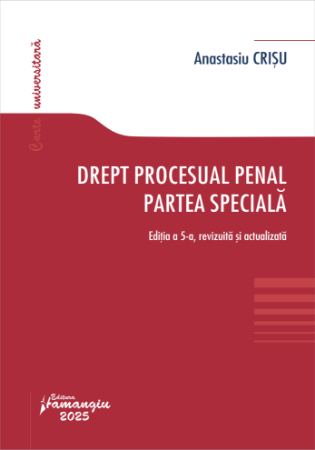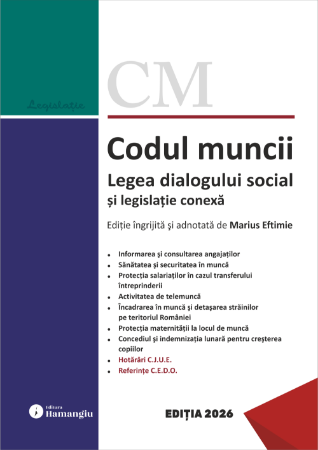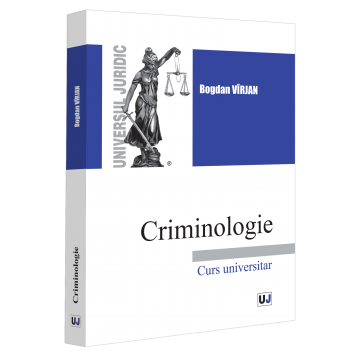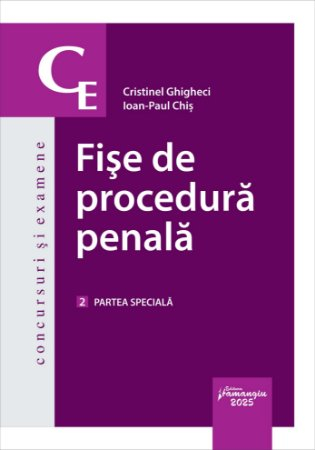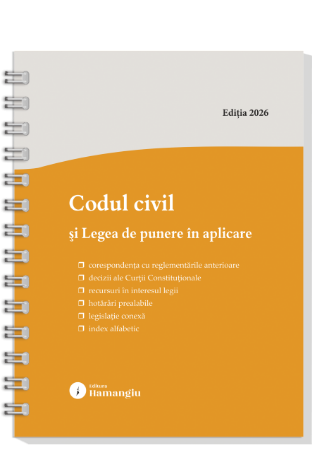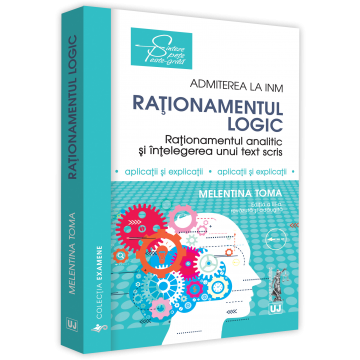Propuneri manuscrise: [email protected]: 0745 204 115
Urmărire comenzi Persoane fizice / Vânzări: 0745 200 357 / Comenzi Persoane juridice: 0721 722 783
6359.png) Go and become who you truly are! From the Bible to mediation, a journey between the conscious and the unconscious
Go and become who you truly are! From the Bible to mediation, a journey between the conscious and the unconscious
6359.png)
Editura: Editura Universitară
Autor: Béatrice Blohorn-Brenneur
Ediția: I
Pagini: 154
Anul publicării: 2024
ISBN: 978-606-28-1810-4
DOI: 10.5682/9786062818104
- Descriere
- Download (1)
- Autori
- Cuprins
- Cuvânt înainte
- Review-uri (0)
The unconscious, even if it remains only partially discovered, tends to transform the way we perceive ourselves, and to help us better understand our reactions and those of others.
The Bible seems to invite us to use its stories as a basis for an inner journey that will transform our lives.
This Book examines the subtle realtionships between these words.
-
Go and become who you truly are! From the Bible to mediation, a journey between the conscious and the unconscious
Descarcă
Chapter I
Adam or the double nature of man / 17
Section I - The two sides of Adam / 17
Section II - Adam and Eve or the refusal to walk the path / 19
Section III - Jung's contribution / 21
I - The collective unconscious and the individual unconscious / 21
II - The social model and the differentiation process / 22
Section IV - "Inner animals from the Bible to essential needs / 23
I - Animals inside / 23
II - Basic needs / 25
Section V - The path to the unconscious in mediation / 25
I - The visible and invisible parts of the trial / 25
II - Why should I go to mediation, if it's all his fault? / 26
III - An example of the family unconscious / 27
Chapter II
Cain or the absence of words / 29
Section I - Revenge / 29
I - Cain led to question his feelings / 30
II - From silence to revenge / 32
Section II - The liberating word / 34
I - Two similar cases with different outcomes / 34
1.1 A trial / 35
1.2 Mediation / 35
Chapter III
Lot's wife or the lure of the past / 39
Section I - Turning the page / 40
I - Destructive hatred / 40
II - The page had not been turned / 42
Section II - From the refusal of mediation to the disaster of litigation / 43
I - A trial maniac / 44
II - The patriarch / 44
III - A shipwreck / 45
IV - Thirst for revenge: leaving school / 45
Chapter IV
Abraham or "Go to you / 49
Section I - The inner journey / 49
Section II - Transposition to mediation / 52
Chapter V
Moses or the passage from slavery to freedom / 55
Section I - The passage / 55
Section II - The road to agreement / 58
I - Looking towards the goal : Peter walks on water / 58
II - Silencing the din within / 59
Chapter VI
Job or the social mask / 61
Section I - The social character / 61
Section II - Tests / 62
Section III - The revolt / 64
Section IV - From the social mask to self-assertion in mediation / 65
I - The social mask / 65
II - The refusal to question / 65
III - Revolt as mediation / 68
Section V - Man as a whole: degrees of consciousness / 70
Chapter VII
Jacob's ladder or the fight with God / 73
Section I - Jacob's Ladder / 73
Section II - Jacob's struggle with God / 74
Section III - From Jacob's ladder to Maslow's pyramid / 77
Section IV - The role of conflict and the struggle with the other in mediation / 78
Chapter VIII
Noah or the celestial wedding / 81
Section I - The ark / 81
Section II - A window opens / 83
Section III - The blessing / 85
Section IV - The mediated agreement / 87
Chapter IX
Jonah or the acceptance of the mission / 92
Section I - From refusal to acceptance of the assignment / 92
Section II - Another relationship / 94
I - Transforming the relationship / 94
II - Rediscovering your place as a father / 95
III - I'm sorry I adopted you / 96
Chapter X
Jesus as Mediator / 101
Section I - The teaching of Jesus / 102
I - A personal journey / 102
II - The relationship with oneself / 103
"Love your neighbour as yourself / 103
Miraculous fishing or the descent into the unconscious / 103
III - Relationships with others / 108
"Love one another as I have loved you" / 108
"Thou shalt not judge / 109
The Good Samaritan / 110
III - Relationships with oneself and others / 110
"If someone slaps you on the right cheek, turn to him the other" / 110
Questioning / 111
Forgiveness and reconciliation / 112
Section II - Teaching Jesus and mediation / 114
I - The resurrection of Lazarus / 114
II - Changing the way we look at others / 116
III - The truth of the heart: the living water of the Samaritan woman / 117
Section III - A mediation led by Jesus : the adulterous woman / 118
Chapter XI
Earthly mediators / 121
Section I - Transformation through mediation / 121
I - A divorce / 121
II - On his feet, he sets off again / 123
III - The old lady and the bag snatcher / 124
Section II - Transformation through non-violent communication (NVC) / 127
Section III - Transformation through restorative justice / 129
Section IV - A mediation conducted in the light of the Gospels / 133
Chapter XII
From animal to spiritual being Become who you are / 137
Section I - The creation of the world in the Bible / 137
I - The transition from the sixth to the seventh day of an unfinished creation / 139
Section II - The wedding at Cana / 141
Section III - The new man / 143
Conclusion / 147
1 - Mediation. It leads to a better understanding of oneself and others. It allows you to reflect on the origins of the conflict, the reasons for it and the resulting relationship problems. It is based on the in-depth listening to each of the parties.
2 - The individual and collective "unconscious", as defined by Jung. This 'descent' of the individual into the unconscious sometimes reveals a part of his past, often forgotten, which makes him act and which he did not suspect. Even if they never go all the way, this journey towards the unconscious sheds light on a part of themselves.
By exploring the unconscious, we can bring to light the hidden aspects of our being and better understand our motivations, behaviours and reactions.
3 - "Bible". The reality of certain texts may seem implausible, such as Noah's Ark, the crossing of the Red Sea by Moses and the Hebrews, the stories of Abraham, Job, Jacob, Jonah in the belly of a whale, Peter walking on water or Jesus turning water into wine, to name but a few. Why and how have they survived the millennia? What other meanings could the bare facts of these stories, which could be likened to fairy tales, reveal? Even if it is difficult to interpret them, some of the writings raise questions about the message they might convey between the lines.
A fourth keyword links the other three: "transformation":
Mediation by a third party can transform the relationship between the parties.
The unconscious, even if it remains only partially discovered, tends to transform the way we perceive ourselves, and to help us better understand our reactions and those of others.
The Bible seems to invite us to use its stories as a basis for an inner journey that will transform our lives.
This book examines the subtle relationships between these words.
*
To improve the judicial response, the legislator opened up a new way in 1995: the mediation. The mediation makes it possible to manage conflicts, no longer with the sole aim of putting an end to them by the authority of the judge, but by proposing a lasting and peaceful solution. The mediator is not a communication mechanic, but helps to bring about change. He adapts to each person and each relationship so that mediation can evolve.
The advent of psychological and sociological knowledge in the 20th century has enabled us to better understand various aspects of the human reality, both the individual and the collective one. In this way, the human sciences can help us to descend into the depths of our unconscious
and identify the old wounds often rekindled by the dispute. They emphasise the importance of man's inner self: the work of transformation through self-discovery and the discovery of others. In this way, individuals can try to take their destiny back into their own hands.
But isn't it precisely the message of the Bible that invites us to Passover, that is to say, to "pass over" so that man can rediscover his divine essence, lost since the fall of Adam and Eve!
The Bible is a collection of books written by Jewish scribes or scholars between 500 and 150 BC. They come from oral sources or various writings. Most of the events recounted in the Bible are supposed to have taken place in the 2nd millennium BC, in the case of the Old Testament. The New Testament is said to have been written between the middle of the 1st and the beginning of the 2nd century. These texts invite us to embark on an inner journey to transform ourselves and move towards our own fulfilment.
*
At first sight, everything seems to oppose the Bible and mediation. On the one hand, a sacred word comes from above: a single truth, revealed in a space governed by an all-powerful Being. On the other, in mediation, a profane word coming from below that contains a plurality of truths under construction, in a space animated by a neutral and impartial person.
However, there are a number of points of convergence. The Bible and mediation offer ways of accessing inner wisdom, greater clarity and a deeper state of awareness. Both focus on inner peace, and contain answers or keys to solving personal and interpersonal conflicts. Their teachings can help everyone rediscover their "inner child".
Over the centuries, the Bible and mediation have shaped societies and cultures. Mediation has been practised for thousands of years under other names, from the "palaver tree" to Confucius' search for "harmony". It continues to evolve today under different approaches.
The oldest mediators are to be found in the Bible, in the Old and New Testaments. The Bible is a path to awakening, a path to freedom: Moses, mediator between God and his people, receives and transmits the Tables of the Law, the Decalogue; Jesus, mediator between God and man, transmits the divine word and intercedes for mankind before God.
The Bible emphasises the importance of words: "In the beginning was the Word". It is the mediator's tool par excellence. Finally, all the human values of humility, openness, benevolence, non-violence, listening, forgiveness, reconciliation and peace are advocated both in the Bible and in mediation.
Provided you don't limit yourself to a primary reading,
new keys to understanding shed new light on the biblical text. It is conceived as an inner journey that enables us to stand up straight and connect with our deepest roots. On his feet, he can set out on his journey. From the time of Adam onwards, all his descendants seem to have been invited to search for their identity and to undergo a transformation. How does this transformation take place?
Mediation must not be reduced to a set of techniques. Mediators are not communication mechanics. Repositioning mediation within spirituality gives it its true dimension. Aimed at re-establishing social peace by restoring dialogue, communication and openness, it takes into account the whole person: body, soul and spirit. Everything is linked: actions, words, thoughts and gestures interact.
The mediation can shed light on the deep, human dimension behind every conflict. In this, it is in line with the Bible, which leads man to discover his true identity. This aspiration towards spirituality does not happen overnight. It requires a journey, and the Bible and mediation can provide the pathway for that journey.

![Go and become who you truly are! From the Bible to mediation, a journey between the conscious and the unconscious [1] Go and become who you truly are! From the Bible to mediation, a journey between the conscious and the unconscious [1]](https://gomagcdn.ro/domains/editurauniversitara.ro/files/product/large/go-and-become-who-you-truly-are-from-the-bible-to-mediation-a-journey-between-the-conscious-and-the-unconscious-043267.jpg)
